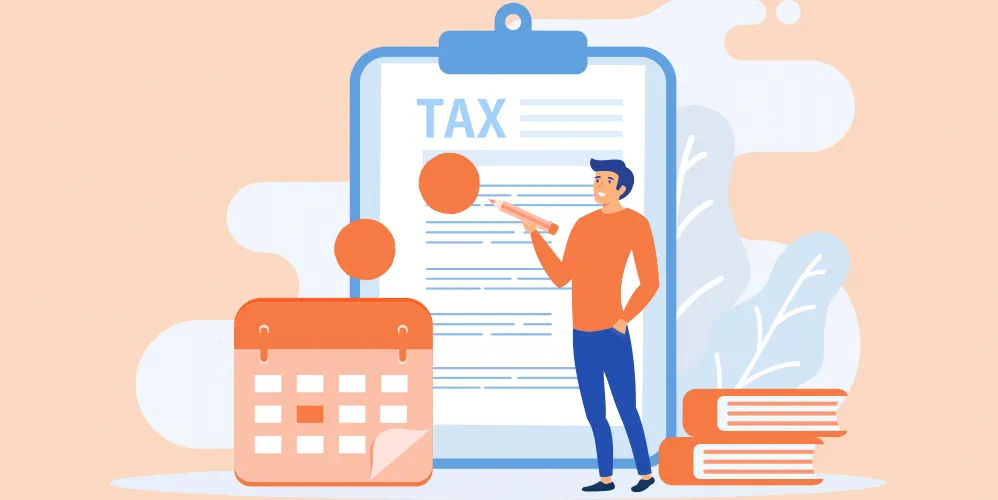
Section 80GG: How to Claim Tax Deductions on Rent Paid
16 Jan 2025

Table of Content
Introduction
Paying rent can be a significant expense, but did you know that you can reduce your taxable income by claiming a deduction under Section 80GG of the Income Tax Act? This section provides a tax deduction to individuals who do not receive house rent allowance (HRA) but still pay rent for their accommodation. Let's break down Section 80GG, how it works, and how you can make the most of it.
What is Section 80GG?
Section 80GG of the Income Tax Act offers tax deductions to individuals who pay rent for their residence but do not receive HRA. The deduction is provided for the rent paid to the landlord for residential accommodation. It's important to note that this benefit is available only to those who do not receive HRA as part of their salary, but still incur rent expenses.
Eligibility Criteria for Section 80GG
To be eligible to claim a deduction under Section 80GG, you must meet the following criteria:
1. No HRA Received :
The individual must not receive house rent allowance (HRA) from their employer.
2. Rent Payment :
The taxpayer must be paying rent for the residential accommodation, and the rent must be paid to the landlord.
3. Self-Occupied or Rented Property :
The deduction is applicable for both self-occupied and rented property, as long as the individual resides in the rented accommodation.
4. Income Source :
The person claiming the deduction should have an income from salary, business, or profession.
5. Filing of Declaration :
The individual must file a Form 10BA, a declaration confirming that the individual is paying rent and fulfilling the other conditions required to claim the deduction.
Calculation of Deduction Under Section 80GG
The amount of deduction under Section 80GG is the lowest of the following:
1. Rent paid minus 10% of the total income :
The rent paid for the accommodation should be reduced by 10% of the taxpayer’s total income.
2. ₹5,000 per month :
This is the maximum deduction that can be claimed under this section. The deduction is limited to ₹5,000 per month.
3. 25% of total income :
25% of the total income before allowing deduction for expenditure under this section
So, the deduction will be the least of these three amounts. For example, if your rent is ₹15,000 per month, and your total income is ₹4,00,000, the deduction you can claim will be the least of:
- Rent paid minus 10% of income: ₹15,000 × 12 months - (10% × ₹4,00,000) = ₹1,80,000 - ₹40,000 = ₹1,40,000
- ₹5,000 per month: ₹5,000 × 12 = ₹60,000
- 25% of total income: 25% of ₹4,00,000 = ₹1,00,000
In this case, the deduction under Section 80GG would be ₹60,000 (the least amount).
Also Read: Tax Saving Options and Investments for Salaried Individuals
To claim a deduction under Section 80GG, follow these steps:
1. Pay Rent :
Ensure that you are paying rent regularly for your accommodation and that the payments are made to a legitimate landlord.
2. File Form 10BA :
To claim the deduction, you must file Form 10BA along with your income tax return. This form acts as a declaration confirming the rent payment and other details related to the accommodation.
3. Provide Rent Details :
In Form 10BA, you will need to provide details such as the name of the landlord, the rent paid, and the address of the rented property.
4. Submit Proof of Rent Payment :
Although the Income Tax Department may not ask for documents when you file your return, it’s important to maintain proof of rent payments such as receipts or bank statements in case you are asked to provide them later.
5. File Your Tax Return :
Once you have completed the necessary documentation, file your income tax return and claim the eligible deduction under Section 80GG.
Common Mistakes to Avoid While Claiming Section 80GG
While claiming deductions under Section 80GG, avoid these common mistakes:
1. Incorrect Rent Payment Calculation :
Ensure you calculate the rent paid correctly, including any other charges like maintenance or utilities. Only the actual rent paid should be considered for the deduction.
2. Failure to File Form 10BA :
One of the most common mistakes is not submitting Form 10BA while filing the return. Ensure that this form is filed to avoid rejection of your claim.
3. Rent Payments Not Supported by Proof :
Keep a record of all rent payments, even though it’s not mandatory to submit documents along with your return. If requested by the tax authorities, you must provide proof.
4. Claiming More Than the Allowed Deduction :
The maximum deduction you can claim under Section 80GG is ₹5,000 per month or the least of the prescribed conditions. Do not claim more than this amount.
5. Eligibility Verification :
Ensure you meet the eligibility criteria to claim Section 80GG. If you receive HRA, you cannot claim this deduction.
Conclusion
Section 80GG is a helpful provision for individuals who pay rent but do not receive house rent allowance (HRA). It allows them to claim deductions on the rent paid, reducing their taxable income. By understanding the eligibility criteria, calculation method, and claiming procedure, you can benefit from this tax-saving provision.
Make sure to avoid common mistakes while filing for 80GG deductions and ensure that all necessary documents are in place. If you’re eligible, this deduction can provide significant relief, especially for those paying high rent for their accommodation.
Also Read: What is Form 16 in Income Tax?
Popular Articles
Related Articles










-
Disclaimer
The contents of this article/infographic/picture/video are meant solely for information purposes and do not necessarily reflect the views of Bank of Baroda. The contents are generic in nature and for informational purposes only. It is not a substitute for specific advice in your own circumstances. Bank of Baroda and/ or its Affiliates and its subsidiaries make no representation as to the accuracy; completeness or reliability of any information contained herein or otherwise provided and hereby disclaim any liability with regard to the same. The information is subject to updation, completion, revision, verification and amendment and the same may change materially. The information is not intended for distribution or use by any person in any jurisdiction where such distribution or use would be contrary to law or regulation or would subject Bank of Baroda or its affiliates to any licensing or registration requirements. Bank of Baroda shall not be responsible for any direct/indirect loss or liability incurred by the reader for taking any financial decisions based on the contents and information mentioned. Please consult your financial advisor before making any financial decision.
Short-Term vs. Long-Term Capital Gains: Key Differences Explained
Investing can be a rewarding journey, but understanding the nuances of capital gains is crucial for effective financial planning. Capital gains can be categorized as short term or long term, each with distinct implications for taxation and investment strategy. In this blog, we’ll explore the key differences between these two types of capital gains, their tax rates, and strategies to optimize your financial outcomes.
Essential Tax Saving Options and Investments for Salaried Individuals
In the world of investing, understanding capital gains is essential for effective financial planning. Short term capital gains (STCG) arise from the sale of assets held for a brief period, typically one year or less. Given the rapid pace of trading in today’s financial markets, investors often find themselves navigating the complexities of STCG tax implications. This guide will break down the essential aspects of short term capital gains, their tax rates, and strategies for effective management.

